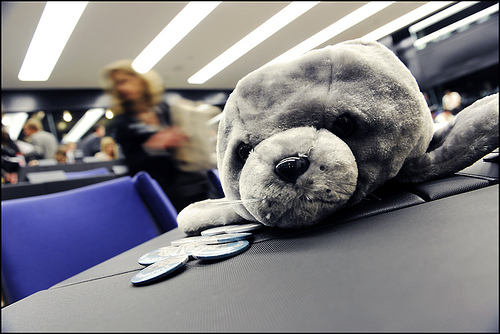Canada and Norway are moving ahead with their joint disputes at the World Trade Organization against a popular European Union ban on importing seal products. Almost immediately, members of the European Parliament shot back with veiled threats to scuttle the Canada-EU Comprehensive Economic and Trade Agreement. They might actually be able to do it. Then again, the Harper government might not care.
“I am deeply disappointed to see Stephen Harper move this senseless WTO case forward in direct opposition to the will of Canadians and Europeans,” said David Martin, a Socialist & Democrat group member of the committee on International Trade of the European Parliament, in a press release by the Humane Society International/Canada. “This pointless attack on the democratic rights of European citizens to choose which products we place on our market is doomed to failure and a colossal waste of millions of Canadian tax dollars. Furthermore, while the Canadian government may want the public to believe otherwise, this WTO challenge is putting a serious strain on the ongoing Canada-EU trade negotiations.”
Colossal waste of Canadian tax dollars? The Human Society International estimates the WTO challenge will cost Canada $10 million in legal fees. And a 2009 poll showed that 86 per cent of Canadians supported the EU ban, which the EU parliament voted into place in May 2009 by a margin of 550 to 49 votes. Half of Newfoundland and Labrador’s sealers support a federal buyout, according to the animal welfare group. No doubt it would be much more cost-effective than an expensive, lengthy and possibly unsuccessful WTO challenge.
Then there’s the alleged threat to Harper’s prized free trade deal with the EU. Already, over 100 MEPs have said the EU parliament should not ratify CETA while the WTO dispute is still active.
“EU citizens are not supporting any trade in products of inherently inhumane activities such as commercial sealing, and we have the right to defend our legislation vigorously at WTO,” said Italian MEP Cristiana Muscardini in the same Human Society media release. “In addition, the European Parliament has made it clear that if Canada continues with the WTO challenge, it is far less likely to ratify the Canada-EU Comprehensive Economic and Trade Agreement currently being negotiated. As I often underlined to the EU Trade Commissioner, it is time to have an Animal Welfare chapter inside any Trade Agreements with third countries.”
So why take this risk? Ostensibly, the WTO dispute alongside Norway (which is not an EU member country) is in defence of Northern, First Nations and Maritime jobs. The government claims the EU seal ban violates several articles of the WTO’s Agreement on Technical Barriers to Trade, as well as the GATT and Agriculture Agreement. At home it looks like Harper is standing up for Canadian interests, but he doesn’t want to do it at the expense of other interests like signing trade deals. Or at least that’s what articles this month about his government’s u-turn on asbestos suggested.
I would suggest it’s very difficult to know exactly how any of these issues — asbestos, seals, tar sands and the EU Fuel Quality Directive — relate to the ongoing CETA negotiations. But they do, and they will become more important as both Canada and the EU look to the final stages of these CETA talks. Until now, trade negotiators have developed a compromise text based on secret mandates from the Harper cabinet and European Commission. Those mandates could run their course by the end of October, at which point trade-offs (on things like procurement, investment, treatment of GMOs, agricultural tariffs or rules of origin) could come down to unrelated issues like the seal hunt.
Another thing to consider is that Harper might not care how this WTO challenge undermines (or not) the CETA negotiations. Seal products are an important source of subsistence and income for Nunavut and other Northern communities. The EU seal ban is a response to opposition and campaigning against the commercial hunts in Eastern Canada. Harper frequently speaks about Northern economic development so defending markets for Northern products is completely consistent with that stance.
It feels odd to be giving the prime minister the benefit of the doubt when polls today show his approval rating sinking to 50 per cent. I do so only to suggest that while Canada’s WTO challenge may prove hazardous to the ongoing CETA negotiations, Harper might not be bothered. There’s no way he can lose face in Canada (among prospective voters to be sure) by sticking up for Northern and Eastern sealers. If the EU wants to let it get in the way of a trade deal, that’s their problem. Or so the prime minister could be thinking.
Luckily Harper has other problems at home with CETA. We used last week’s negotiations in Ottawa to talk about one of them. Not everyone eats seal meat but everyone, including Conservative voters, at some point takes out a prescription. The idea that CETA could make drug plans more expensive if Canada sides with the EU and Big Pharma has even former ambassador to the WTO and chief NAFTA negotiator John Weeks asking the government “to think long and hard before it formulates final positions on these matters.”
Drug costs aren’t the only good reason to get in the way of CETA. But if the seal issue is ultimately going to finish the talks off, well so be it. You won’t hear me complaining.
Photo: European Parliament/Flickr
What’s Harper up to? Award-winning journalist Karl Nerenberg keeps you in the know. Donate to support his efforts today.



